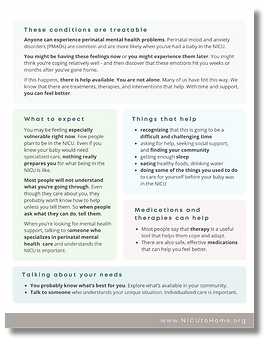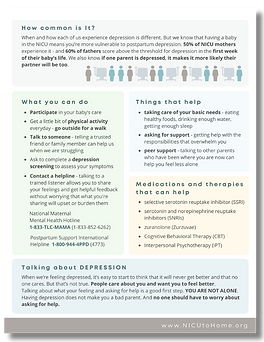top of page
NICU Mental Health Roadmap
Taking care of your mental health is good for you and good for your baby.
We all know that life is full of ups and downs,
but no one understands that more than a NICU parent.
However you arrived in the NICU and however long your baby's stay,
your experience has likely brought on a range of complicated emotions:
from fear, worry, and periods of grief and sadness
to joy, relief, and moments of celebration.
Though each family's NICU journey is unique, having a complicated emotional response to your baby's time in the hospital is normal
- and expected.
As a group of perinatal and family mental health professionals,
neonatologists, physicians, nurses, pediatricians, and former NICU parents, we know how hard this can be - but we want to know there is help.
Taking care of your mental health is good for you and good for your baby.
We've gathered information and resources that can help you understand your feelings during this difficult time. If you need support, we can help.
People care about you and how you’re doing.
You deserve to feel empowered in your new role as a NICU parent
and as your baby’s primary caregiver.
Please remember that YOU ARE NEVER ALONE.
And if you ever think "I can't do this!" - just remember:
You can. You will. You already are!

- Your Colleagues at the
National Network of NICU Psychologists (NNNP)
CONTENTS:
Your Mental Health: Things Every Parent Should Know
Understanding Your Emotions
-
What is Trauma
-
Common Responses to Trauma
-
Post-Traumatic Stress
-
Resilience
Tools for Taking Care of Myself
-
Box Breathing
-
5-4-3-2-1 Grounding Exercise
Perinatal Mental Health Conditions
My Mental Health Plan
Tools for Taking Care of Myself
-
My Mood
-
My Needs Today
-
My Not-To-Do List
Coping with Complicated Emotions
-
Anxiety
-
Obsession - Compulsion
-
Grief
-
Depression
-
Anger
-
Shame and Guilt
-
Scary Feelings
-
PTSD
Tools for Taking Care of Myself
-
Skills I Can Use
-
Color Your Emotions
-
When If Feels Like Too Much
-
Self-Compassion

This booklet will be available as a downloadable PDF in January 2026.
Email Erika Goyer egoyer@nationalperinatal.org
for inquiries and co-branding opportunities.
CONTENT EXPERTS:
-
Allison Dempsey, PhD
-
Pamela A. Geller, PhD
-
Casey Hoffman, PhD
-
Danielle J. Key, PsyD
-
Andrea L. Nelson, PsyD
-
Brenda Papierniak, PsyD, PMH-C
-
Chavis Patterson, PhD
-
Celeste Poe, PhD, PMH-C
-
Sage N. Saxton, PsyD
-
Cara Solness, PhD
-
Shelly Steinwurtzel, PsyD
-
Kara Wahlin, MFT
EDITOR: Erika Goyer National Perinatal Association
About this roadmap:
This resource was created by the
National Network of NICU Psychologists (NNNP) under a grant from the Ann & Robert H Lurie Children's Hospital of Chicago.
Things Every Parent Should Know
Pregnancy, childbirth, and parenting bring dramatic changes to your life - and your emotional health.
While it can be an exciting and joyful time, the changes that accompany the perinatal period can also can also leave you feeling anxious, sad, tired, overwhelmed, and irritable.
DOWNLOAD
What is Trauma?
When you, someone you love, or something you care about is threatened or endangered, it can be traumatic.
Trauma is more than the event or the thing that happened, it is our lasting emotional response to what happened.
DOWNLOAD
Post-Traumatic Stress
Being in the NICU is stressful. With time and support, most of us will feel better. But sometimes the distress stays with us and makes it difficult to cope.
DOWNLOAD
Resilience
Resilience is the ability to adapt, cope, and recover in the face of adversity, trauma, and stress. It’s the ability to face setbacks - and still more forward with purpose and integrity.
There are things we can do to build our resilience and increase our capacity to cope. We know that some things act as protective factors and can help buffer the stress of traumatic events.
DOWNLOAD
Box Breathing
Slow, deep, intentional breathing can be a great way to calm an anxious mind and body.
Pausing for a few minutes to practice this breathing technique can help us pay attention to our bodies and re-center our thoughts so that we can focus on what is most important to us.
DOWNLOAD
5-4-3-2-1
Grounding Exercise
Slow, deep, intentional breathing can be a great way to calm an anxious mind and body.
Pausing for a few minutes to practice this breathing technique can help us pay attention to our bodies and re-center our thoughts so that we can focus on what is most important to us.
DOWNLOAD
Perinatal Mental Health Conditions
We know that our bodies change dramatically during pregnancy and postpartum. These changes can have significant effects on our mental health.
Periods of anxiety, depression, grief, sadness, and anger are normal. But they should get better and become less frequent and less intense with time.
When they don’t get better - or get worse - it may be a sign that we have developed a perinatal mood and anxiety disorder (PMAD).
DOWNLOAD
My Mental Health Plan
Because perinatal mental health conditions are common - and treatable - I am making a plan for my mental health and wellbeing.
If I'm struggling, there are things I can do to feel better. And I can ask for help.
DOWNLOAD
My Mood
How am I feeling?
Naming my feelings can help me understand them better.
It can also help me talk about them with the people who care about me.
DOWNLOAD
My Needs Today
We all have needs. And we all want to help each other. Sometimes we just don't know how.
But we can make it easier. When someone asks, "How can I help?" we can tell them.
Because people do care about us - and they want to support us. If we take time to think about what we need, we will be able to communicate it more clearly. This list can help.
DOWNLOAD
My Not-To-Do List
We all have To-Do lists.
But when things are difficult - and when we're coping with extraordinary stressors - we need to prioritize.
We need a Not-To-Do list.
DOWNLOAD
Coping with Complicated Emotions
Anxiety
Anxiety is a natural reaction to uncertainty that helps us prepare for future threats.
DOWNLOAD
Obsession - Compulsion
Perinatal obsessive compulsive disorder (ODC) is a condition characterized by intrusive thoughts that are often accompanied by a need to perform rituals to lessen distress.
DOWNLOAD
Depression
Perinatal depression is a low mood disorder.
Depression is common. And yet, it is probably the most under-diagnosed complication of pregnancy.
DOWNLOAD
Anger
Anger is a common, but often stigmatized, emotion. It is a natural response when there are things that feel hurtful, harmful, or unfair.
DOWNLOAD
Shame and Guilt
We feel guilt when we do something wrong
and we feel shame when we believe we’re flawed.
NICU parents can struggle with these feelings - when they often shouldn't.
DOWNLOAD
Scary Feelings
All new parents will experience some scary thoughts and feelings.
For some, those thoughts and feelings do not let up, even with support.
Delusions are false beliefs that are not based in reality.
Hallucinations are sensory experiences that seem real, but are not.
Intrusive thoughts are unwanted and disturbing thoughts or images that pop into someone’s head.
These can be features of perinatal psychosis, a serious mental health condition
DOWNLOAD
Delusions, Hallucinations, Intrusive Thoughts
PTSD
PTSD is a set of symptoms that may develop after a traumatic event.
Up to 53% of mothers and 33% of fathers report symptoms of posttraumatic stress after the NICU.
DOWNLOAD
Skills I Can Use
Some days and harder than others and sometimes we need to stop, pay attention to what we’re feeling, and do something that will help us feel better.
When we feel discomfort and distress, there are skills that we can use to self-regulate and cope with uncomfortable feelings and sensations.
DOWNLOAD
Color Your Emotions
Stop, take a moment, and pay attention to what you’re feeling in your body.
Being mindful and aware of the sensations you’re feeling can help you understand and process your feelings.
When you’re ready, you can draw what you’re feeling and describe it.
DOWNLOAD
When It Feels Like Too Much
Sometimes our emotions feel like more than we can handle.
When this happens - instead of reacting - we can stop, pay attention, and be deliberate.
Taking time to examine our emotions can help us feel like we have more control over them.
DOWNLOAD
Self-Compassion
When something traumatic happens, it threatens our sense of safety and control.
Sometimes we look for someone to blame. And we often blame ourselves - when we shouldn't.
Challenging these negative thoughts can help us see things in a new way and help us show compassion for ourselves and each other.
DOWNLOAD
About this roadmap:
This resource was created by the
National Network of NICU Psychologists (NNNP) under a grant from the Ann & Robert H Lurie Children's Hospital of Chicago.

bottom of page









































